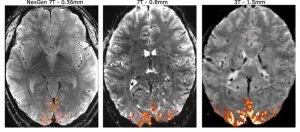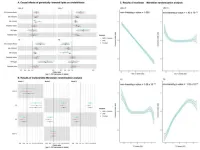(Press-News.org) Brain Boost: Can a Coach Help Elders at Risk for Alzheimer’s?
Study shows cognitive improvements when participants keep active and socially engaged, control blood pressure and diabetes.
As more medications move towards federal approval for Alzheimer’s disease, a new study led by researchers at UC San Francisco and Kaiser Permanente Washington has found that personalized health and lifestyle changes can delay or even prevent memory loss for higher-risk older adults.
The two-year study compared cognitive scores, risk factors and quality of life among 172 participants, of whom half had received personalized coaching to improve their health and lifestyle in areas believed to raise the risk of Alzheimer’s, such as uncontrolled diabetes and physical inactivity. These participants were found to experience a modest boost in cognitive testing, amounting to a 74% improvement over the non-intervention group.
Improvements were also noted between the two groups in measurements of risk factors and quality of life, translating approximately to 145% and 8%, respectively, the researchers reported. The study publishes Nov. 27, 2023, in JAMA IM.
Older adults highly motivated to make changes
The study, known as SMARRT, for systematic multi-domain Alzheimer’s risk reduction trial, follows previous work from other researchers that has yielded contradictory results on the effects of health and lifestyle interventions. This study differed, though, in providing personal coaching that was customized to each participant.
“This is the first personalized intervention, focusing on multiple areas of cognition, in which risk factor targets are based on a participant’s risk profile, preferences and priorities, which we think may be more effective than a one-size-fits-all approach,” said first author and lead investigator Kristine Yaffe, MD, vice chair of research in psychiatry and professor in the UCSF departments of neurology, psychiatry, and epidemiology and biostatistics.
“In an earlier survey of 600 older adults, we found that most were concerned about Alzheimer’s disease and related dementias. They wanted to know their personal risk factors and were highly motivated to make lifestyle changes to lower dementia risk,” said Yaffe, referring to her collaboration with co-lead investigator and co-author Eric B. Larson, MD, MPH, former vice president for research and health care intervention at Kaiser Permanente Washington.
Participants in the current study, as well as the earlier survey, were enrolled in Kaiser Permanente Washington and were between 70 and 89 years old. They had at least two of eight risk factors for dementia: physical inactivity, uncontrolled hypertension, uncontrolled diabetes, poor sleep, use of prescription medications associated with risk of cognitive decline, high depressive symptoms, social isolation and current smoking status.
The intervention participants met with a nurse and health coach and selected specific risk factors they wanted to address. They received coaching sessions every few months to review their goals, which ranged from tracking hypertension to walking a certain number of steps per day or signing up for a class. The meetings started in person and switched to phone calls during the pandemic.
Non-intervention participants were similar in age, risk factors and cognitive scores and received educational material, mailed every three months, on dementia risk reduction.
Pandemic did not offset study’s positive effects
“We were pleasantly surprised that the positive results of the trial were not offset by the impact of the pandemic,” said Larson, who is currently professor of medicine at University of Washington. “We know that isolation from social distancing took a heavy toll on cognition, social lives, and mental and physical health in some older adults. But participants in the intervention group fared better cognitively and had fewer risk factors after the trial, during the pandemic, than they did before.”
Unlike anti-amyloid medications, risk-reduction programs are not costly, nor do they have strict eligibility criteria or require extensive monitoring for side-effects, said Yaffe, who is also affiliated with the San Francisco VA Health Care System and the UCSF Weill Institute for Neurosciences.
“Hopefully in the future, treatment of Alzheimer’s and related dementias will be like cardiovascular disease management, with a combination of risk-reduction and specific drugs targeted for disease mechanisms,” she said.
Co-Authors: Eric Vittinghoff, PhD, and Deborah E. Barnes, PhD, MPH, of UCSF; Carrie B. Peltz, PhD, of the San Francisco VA Health Care System; and Sascha Dublin, MD, PhD, Lynn Fleckenstein, MA, Dori Rosenberg, PhD, MPH, and Benjamin H. Balderson, PhD, of Kaiser Permanente Washington Health Research Institute, Seattle.
Funding Support: National Institute on Aging (1R01AG057508)
Disclosures: Please see the paper.
About UCSF: The University of California, San Francisco (UCSF) is exclusively focused on the health sciences and is dedicated to promoting health worldwide through advanced biomedical research, graduate-level education in the life sciences and health professions, and excellence in patient care. UCSF Health, which serves as UCSF's primary academic medical center, includes top-ranked specialty hospitals and other clinical programs, and has affiliations throughout the Bay Area. UCSF School of Medicine also has a regional campus in Fresno. Learn more at https://ucsf.edu, or see our Fact Sheet.
###
Follow UCSF
ucsf.edu | Facebook.com/ucsf | YouTube.com/ucsf
END
Brain boost: Can a coach help elders at risk for Alzheimer’s?
2023-11-27
ELSE PRESS RELEASES FROM THIS DATE:
Early-stage stem cell therapy trial shows promise for treating progressive MS
2023-11-27
An international team has shown that the injection of a type of stem cell into the brains of patients living with progressive multiple sclerosis (MS) is safe, well tolerated and has a long-lasting effect that appears to protect the brain from further damage.
The study, led by scientists at the University of Cambridge, University of Milan Bicocca and Hospital Casa Sollievo della Sofferenza (Italy), is a step towards developing an advanced cell therapy treatment for progressive MS.
Over 2 million people live with MS worldwide, ...
Irritability, agitation, and anxiety in Alzheimer’s patients caused by brain inflammation, study says
2023-11-27
PITTSBURGH, Nov. 27, 2023 – Common neuropsychiatric symptoms that doctors see in Alzheimer’s disease patients originate from brain inflammation rather than amyloid and tau proteins, report University of Pittsburgh School of Medicine researchers today in JAMA Network Open.
The finding strengthens mounting evidence for the role of neuroinflammation in Alzheimer’s progression and suggests new pathways for the development of therapies targeting neurological symptoms of the disease.
“Neuropsychiatric symptoms such as irritability, agitation, anxiety and depression are among the most difficult ...
Sensitive ecosystems at risk from mine waste
2023-11-27
Nearly a third of the world’s mine tailings are stored within or near protected conservation areas, University of Queensland research has found.
A study led by UQ’s Bora Aska, from the Sustainable Minerals Institute and School of the Environment, said these waste facilities pose an enormous risk to some of earth’s most precious species and landscapes.
“Mine tailings contain the waste and residue that remains after mineral processing, and the storage facilities built to contain it are some of the world’s largest engineered structures,” Ms Aska said.
“We found of the 1,721 disclosed tailings ...
Genes influence whether infants prefer to look at faces or non-social objects
2023-11-27
Whether infants at five months of age look mostly at faces or non-social objects such as cars or mobile phones is largely determined by genes. This has now been demonstrated by researchers at Uppsala University and Karolinska Institutet. The findings suggest that there is a biological basis for how infants create their unique visual experiences and which things they learn most about. The study has been published in the scientific journal Nature Human Behaviour.
The way in which we explore our environment with our eyes affects what we notice, think about and learn. The new study analysed preference for faces versus non-social objects in ...
Collaboration between women helps close the gender gap in ice core science
2023-11-27
A Perspective article published today in Nature Geoscience tackles the longstanding issue of gender representation in science, focusing on the field of ice core science. Prior work has shown that despite progress toward gender parity over the past fifty years1, women continue to be significantly underrepresented within the discipline of Earth sciences2 and receive disproportionately fewer opportunities for recognition, such as invited talks, awards, and nominations3. This lack of opportunity can have long-term negative impacts on women’s careers. To help address these persistent gender gaps, the study evaluates patterns related to women’s publication in ice core science over the ...
Stanford Medicine study reveals why we value things more when they cost us more
2023-11-27
Ahab hunting down Moby Dick. Wile E. Coyote chasing the Road Runner. Learning Latin. Walking over hot coals. Standing in a long line for boba tea or entrance to a small, overpriced clothing retail store. Forking up for luxury nonsense.
What do these activities have in common? They’re all examples of the overvaluation of what economists call “sunk costs”: the price you’ve already irretrievably paid in time, money, effort, suffering or any combination of them for an item, an experience or a sense of self-esteem.
It’s a ...
Innovative design achieves tenfold better resolution for functional MRI brain imaging
2023-11-27
An intense international effort to improve the resolution of magnetic resonance imaging (MRI) for studying the human brain has culminated in an ultra-high resolution 7 Tesla scanner that records up to 10 times more detail than current 7T scanners and over 50 times more detail than current 3T scanners, the mainstay of most hospitals.
The dramatically improved resolution means that scientists can see functional MRI (fMRI) features 0.4 millimeters across, compared to the 2 or 3 millimeters typical of today's standard 3T fMRIs.
"The NexGen 7T scanner is a new tool that allows us to look at the brain circuitry underlying different diseases of the brain with ...
Hamburg collaboration paves the way to cleaner technologies for industry
2023-11-27
During the nearly five decades of its operation, the European Molecular Biology Laboratory (EMBL) in Hamburg has developed many fruitful collaborations with other scientific institutions located in the Hamburg metropolitan area. One example is the long-lasting collaboration between researchers at EMBL Hamburg and the Center for Biobased Solutions (CBBS) at the Hamburg University of Technology (TUHH), which has recently yielded new insights into the structure and function of a lipid-degrading enzyme found in a microbe adapted to living in extreme conditions. The findings could help improve ...
Pioneering research method reveals bluefin tuna’s fate
2023-11-27
The return of bluefin tuna to Northern European waters is a conservation success story, but rising sea temperatures in their Mediterranean nursery grounds mean this recovery may be short-lived, according to new research led by the University of Southampton.
Temperatures expected in the Mediterranean within the next 50 years are expected to drive juvenile tuna out of the Mediterranean, where they may be accidentally caught in existing sardine and anchovy fisheries – requiring fishery managers to adapt their methods to allow tuna nurseries to establish.
Outlining the research, published in Nature, lead author Clive Trueman, Professor of Geochemical Ecology ...
New study sheds light on the link between lipids and cholelithiasis
2023-11-27
A new study published in the journal Gut has shed light on the complex relationship between serum lipids, lipid-modifying targets, and cholelithiasis, a common condition characterized by the formation of gallstones. The study, led by researchers at the First Hospital of Jilin University, employed a combination of observational and Mendelian randomization (MR) approaches to comprehensively assess these associations.
Cholelithiasis is a prevalent hepatobiliary disorder that primarily affects Western populations. It is a significant risk factor for cholangiocarcinoma, ...






